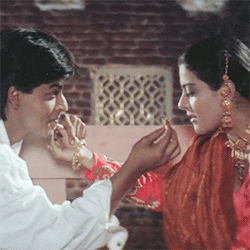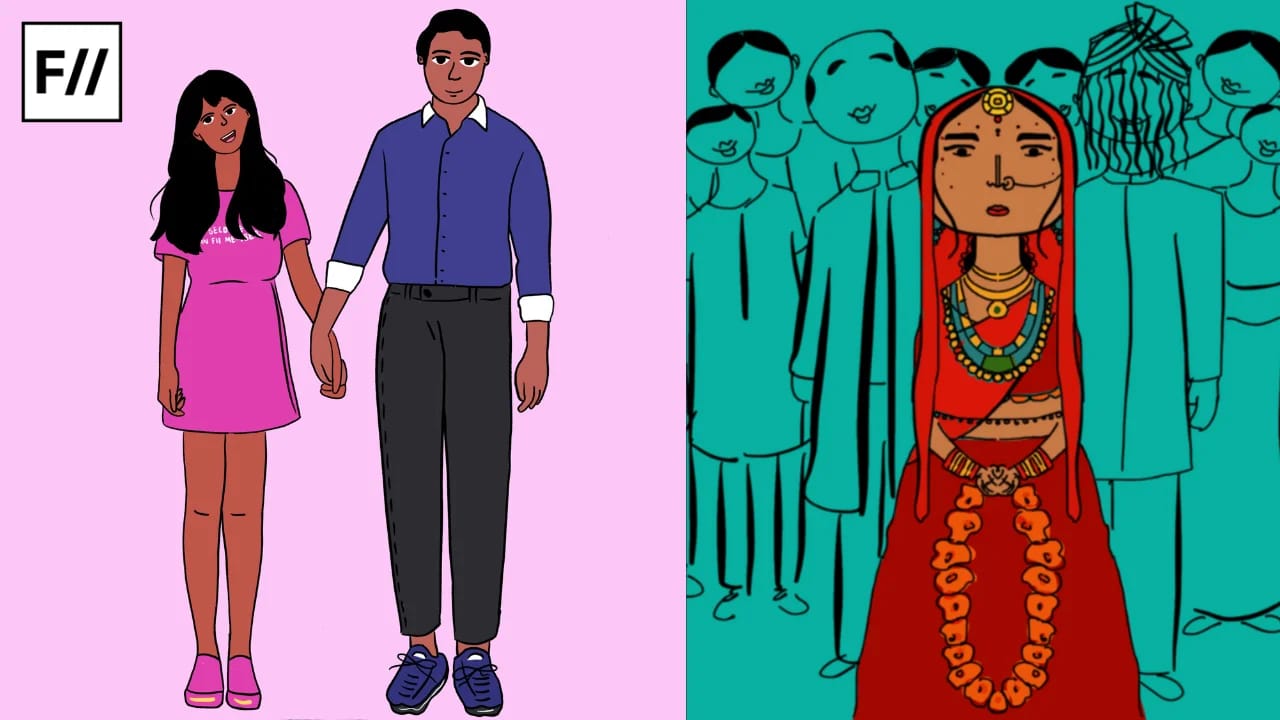Posted by Madhura Chakraborty
Researching Karva Chauth comes with unforeseen perils. For one, Google, Facebook and Instagram algorithms have taken it upon themselves to inundate me with Karva Chauth advertisements. Growing up in a middle-class, urban, Bengali family I had seen women of the family keep fasts but mostly for the welfare of children. I was a selfish brat who was very happy to see my mother and grandmother make so much fuss about me and feed me loads of my favourite fruits.
But the first time I heard of Karva Chauth was at a movie theatre, aged 10. Kajol was faux fainting at the prospect of being fed the first morsel of food by the fiance she did not love and tricking Shah Rukh Khan into feeding her. This moment made pop culture history – here was a stuffy, annoying ritual which was elevated to the heights of cool because it wasn’t limited to sanskari aunties anymore: eloping lovers were expressing love by fasting for each other.

Cut to the present, teenage girls regularly fast for their boyfriends, praying for their long life. Karva Chauth has arrived. A festival of love as some call it, this is just one more occasion for advertisers to ply you with everything from garish lehengas to bejewelled sieves and special facials and hairdos. After all, you have to look pretty for the husband whose long life you are praying for. There are even apps that help you with rituals and include a virtual sieve to view the moon through. It’s all about sacrifice so your partner can thrive.
https://www.instagram.com/p/BZhDcpaHXSN/
There is a catch though, with this supposed ‘Indian Valentine’s Day’: it is rather unequal. If performing a punishing ritual is the only way to show love and value your partner, then clearly men don’t seem to want their partners’ well-being or long life. Away from the glitz and glamour of sundown Karva Chauth parties and 20% off on bangles, Jyothsna Patel in rural Odisha also fasts all day for the Sabitri ritual. She worships her husband in the evening, completing the ritual with drinking the water used to wash his feet and then asks for his blessing. “We perform this ritual to protect our husbands from unforeseen problems. After the rituals are complete, I serve him food and only then I eat some fruits,” she elaborates.
Many modern urban women might balk at drinking water used to wash their partners’ feet. But is Karva Chauth really that different? There are rare exhortations to men to also keep fast but this is rather thin on the ground. Jyothsna smiles and says “It will be nice if he also prayed for my long life.” But it is unprecedented say the men. Whoever has heard of men fasting for their wives?
In her column Mrs Funny Bones, amidst rants about the ridiculousness of such fasts, Twinkle Khanna writes that the good thing about Indians is that they will “follow traditions and rituals as long as they do not demean or harm us, or cause us to do the same to another, while making our elders happy”. She postulates that this is how we, Indians, manage to hold our large families together and live in harmful.
Not harmful? The internet is full of advice for pregnant women who want to fast, endangering their and their foetus’ well-being. And why are traditions and keeping unreasonable families happy, limited to women? There is one word which explains this phenomenon and that is patriarchy. Patriarchy, that normalises inequality, places disproportionate burdens of women and underscores with every ritual how they are inferior to men. After all, their lives are not worth praying for.
Mukteshwar, Jyothsna’s husband in Nuagaon village, clearly says “If a woman performs these rituals following the Hindu texts (puranas) then she will die before her husband.” Clearly, death is preferable to being a widow in this worldview. In fact, given that women the world over have a longer average lifespan than men, it can easily be inferred that by performing these rituals, women are indirectly praying for their own untimely demise. And if we keep dismissing this phenomenon as being limited to ‘backward’ ‘rural’ ‘uneducated’ people, then we need to take off our blinkers and smell the mehendi.
Also Read: Limited period: Karva Chauth, One Day Offer For Increasing The Life Span Of Your Husband
Feminism In India and Video Volunteers are hosting a Tweet Chat on Karva Chauth on the 6th of October (today) from 1 – 2 PM.
Featured Image Credit: Youtube
This article has been republished with permission from Video Volunteers.
About the author(s)
Video Volunteers works to centre the lived experience of marginalised communities in public discourse and decision-making. Over the past 20 years, we’ve supported community-led reporting models in India and globally, enabling people to document issues affecting their lives and push for accountability. In India, our network of Community Content Creators has produced over 18,000 videos on local governance and social justice issues, contributing to more than 3,200 documented resolutions and impacting over 42 million people. Our work focuses on strengthening accountability, amplifying citizen voice, and using accessible technology to make institutions more responsive.




